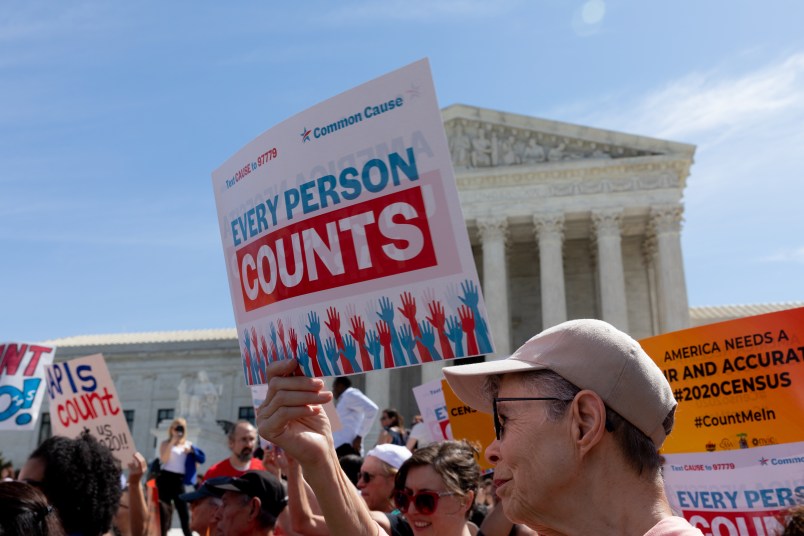An appeals court agreed Tuesday to let a federal judge in Maryland reconsider his previous ruling on whether there was a discriminatory intent behind the Trump administration’s move to add the citizenship question.
The development throws another wrench into what was already going to be dramatic and high-stakes decision from the Supreme Court in the days to come about whether the citizenship question can stay on the census. The high court is currently considering a separate case that raised different legal issues about Commerce Secretary Wilbur Ross’ decision to add the question and it is not clear what will happen procedurally if a federal judge were decide it was discriminatory after the justices hand down their ruling.
The judge in Maryland U.S. District Judge George Hazel initially did not find that the question had violated the Constitution’s Equal Protection clause in a ruling that struck it down for other reasons.
After the challengers put forward new evidence from the files of a deceased GOP consultant apparently involved in the administration’s move, Hazel sought to have the case sent back to him from the 4th US Circuit Court of Appeals, where the case had been appealed.
The appeals court granted that request in an order Tuesday.
The Justice Department opposed the move to send the case back to Hazel and made a last minute push to ask the Supreme Court to address the equal protection claim in the ruling it hands down, likely by the end of the week. In a letter to the Supreme Court filed Tuesday just before the appeals court order, the Justice Department said the new allegations from the challengers were “based on a speculative conspiracy theory that is unsupported by the evidence and legally irrelevant to demonstrating that Secretary Ross acted with a discriminatory intent.”
The new evidence was found on the back-up hard drives of Thomas Hofeller, the GOP’s go-to gerrymandering consultant who died last year. Hofeller analyzed the effect of excluding noncitizens from redistricting — a move that would boost Republicans and non-Hispanic whites, Hofelloer concluded — in an unpublished 2015 study that said a census citizenship question was needed for the change. Hofeller was the first person to recommend that the incoming Trump administration look into the census citizenship issue and he secretly co-wrote a draft justification for the question that was given to the Justice Department, which officially claimed it would help Voting Rights Act enforcement.
Altogether, the evidence suggests that Hofeller had partisan, discriminatory reasons for advocating for the question and then helped craft the bogus rationale use to cover up those reasons, the legal challengers to the question say.
Hazel said in an order last week that the evidence raised a “substantial issue” that warranted him reconsidering his ruling on the equal protection claim.
Two appeals court judges, both Democratic appointees, of a three-judge panel agreed on Tuesday. (The third judge was an appointee of George W. Bush). Judge James Wynn, an Obama appointee, wrote a concurrence that provided Hazel a road map for considering whether the Trump administration had a discriminatory intent. Wynn, quoting the relevant case law, said that “invidious discriminatory purpose may often be inferred from the totality of the relevant facts, including the fact, if it is true, that the law bears more heavily on one race than another.”
“To that end, even in the absence of direct evidence of invidious discriminatory intent, this Court and other courts have found such intent when, for example, a governmental decisionmaker was aware that an action was likely to disproportionately impact a minority group, the decisionmaker declined to impose ameliorative measures to minimize the likely disproportionate impact, the decisionmaker’s process for deciding to take the action deviated from standard practice, and the decisionmaker provided pretextual reasons for taking the action.”
Ross disregarded Census Bureau studies that showed that the citizenship question would discourage immigrant communities from responding to the census and that there were more accurate, less costly ways of obtaining the Voting Rights Act data. Hazel and two other federal judges have ruled that Ross’ process for adding the question violated administrative law and that his reasons for doing so were pretextual.
Wynn’s concurrence also addressed the time sensitivities of the proceeding. The administration has claimed that it needs to send the census forms to the printers by July 1, though one Census official testified that the forms could be finalized as late as October.
Wynn suggested Hazel consider blocking the citizenship question immediately with a preliminary injunction so as to prevent the printing of the forms, which, from at least “the Government’s perspective,” would render “the case moot. ”
Read it below:
Correction: This story has been corrected to clarify that Judge James Wynn was appointed by President Obama, not President Clinton, as originally stated.







This is good news. Pretty obvious that Republicans were trying to blow up the Census to gain a significant advantage.
It’s a step in the right direction. This isn’t over yet by any means, but at least it’s being reconsidered.
I suspect SCOTUS will render all this moot.
I’m still of a mind that Roberts doesn’t want this kind of thing to be his legacy. I’m still hopeful, but not Mueller report hopeful.
Shine a light: